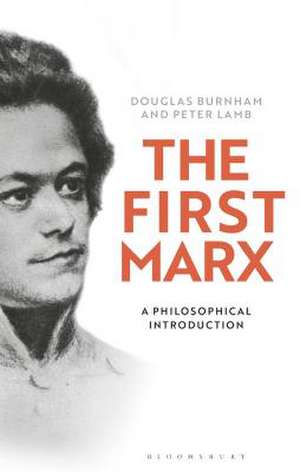The First Marx: A Philosophical Introduction
Autor Peter Lamb, Professor Douglas Burnhamen Limba Engleză Paperback – 14 noi 2018
| Toate formatele și edițiile | Preț | Express |
|---|---|---|
| Paperback (1) | 179.56 lei 6-8 săpt. | |
| Bloomsbury Publishing – 14 noi 2018 | 179.56 lei 6-8 săpt. | |
| Hardback (1) | 715.19 lei 6-8 săpt. | |
| Bloomsbury Publishing – 14 noi 2018 | 715.19 lei 6-8 săpt. |
Preț: 179.56 lei
Preț vechi: 208.07 lei
-14% Nou
Puncte Express: 269
Preț estimativ în valută:
34.36€ • 35.87$ • 28.44£
34.36€ • 35.87$ • 28.44£
Carte tipărită la comandă
Livrare economică 05-19 aprilie
Preluare comenzi: 021 569.72.76
Specificații
ISBN-13: 9781350029613
ISBN-10: 1350029610
Pagini: 240
Dimensiuni: 156 x 234 x 20 mm
Greutate: 0.39 kg
Editura: Bloomsbury Publishing
Colecția Bloomsbury Academic
Locul publicării:London, United Kingdom
ISBN-10: 1350029610
Pagini: 240
Dimensiuni: 156 x 234 x 20 mm
Greutate: 0.39 kg
Editura: Bloomsbury Publishing
Colecția Bloomsbury Academic
Locul publicării:London, United Kingdom
Caracteristici
Includes an extensive bibliography and list of recommended reading as well as a timeline contextualising Marx's early period
Notă biografică
Douglas Burnham is Professor of Philosophy at Staffordshire University, UK. He is author of The Nietzsche Dictionary (Bloomsbury 2014).Peter Lamb is Associate Professor of Politics and International Relations at Staffordshire University, UK. He is author of Marx and Engels' Communist Manifesto: a Reader's Guide (Bloomsbury, 2015).
Cuprins
prefaceacknowledgements1. Introduction2. Production3. Alienation4. Exploitation 5. Change6. Emancipation7. Conclusionsbibliographyindex
Recenzii
In The First Marx, Douglas Burnham and Peter Lamb diligently and brilliantly build a temporally resonant Marx out of his early writings, and garner his splintered insights to work as a distinct political philosophy. They have equally productively and generatively applied Marxian ideas to the contemporary human condition in ways that open the door to future research and scholarship on Marx. The First Marx will long endure as a must-have primer for both early and advanced students and scholars of Marx.
The authors present a serious and often well-argued analysis of the political philosophy of the young Marx.
Much more than a study of the Marx's early writings, The First Marx draws on an unusually wide array of primary source materials. Burnham and Lamb construct a first political philosophy for Marx that reflects the power and sweep of his critical thinking. Thematic chapters provide new insights into alienation, exploitation, emancipation and other concepts that Marx developed philosophically. In this book we are presented with a coherent picture that biographical studies do not achieve. The early Marx did not know that he would become the later Marx, and Burnham and Lamb have done us a service in stopping the clock at a crucial point.
The First Marx fills a gap in the literature on Marx by taking Marx's early work, seriously as a complete philosophical system. It is an invaluable resource for understanding key terms in Marxism such as "alienation," and would lend itself to discussion of humanism as well as the importance of Marx's early work as foundational to the entire concept of social construction.
The authors present a serious and often well-argued analysis of the political philosophy of the young Marx.
Much more than a study of the Marx's early writings, The First Marx draws on an unusually wide array of primary source materials. Burnham and Lamb construct a first political philosophy for Marx that reflects the power and sweep of his critical thinking. Thematic chapters provide new insights into alienation, exploitation, emancipation and other concepts that Marx developed philosophically. In this book we are presented with a coherent picture that biographical studies do not achieve. The early Marx did not know that he would become the later Marx, and Burnham and Lamb have done us a service in stopping the clock at a crucial point.
The First Marx fills a gap in the literature on Marx by taking Marx's early work, seriously as a complete philosophical system. It is an invaluable resource for understanding key terms in Marxism such as "alienation," and would lend itself to discussion of humanism as well as the importance of Marx's early work as foundational to the entire concept of social construction.
